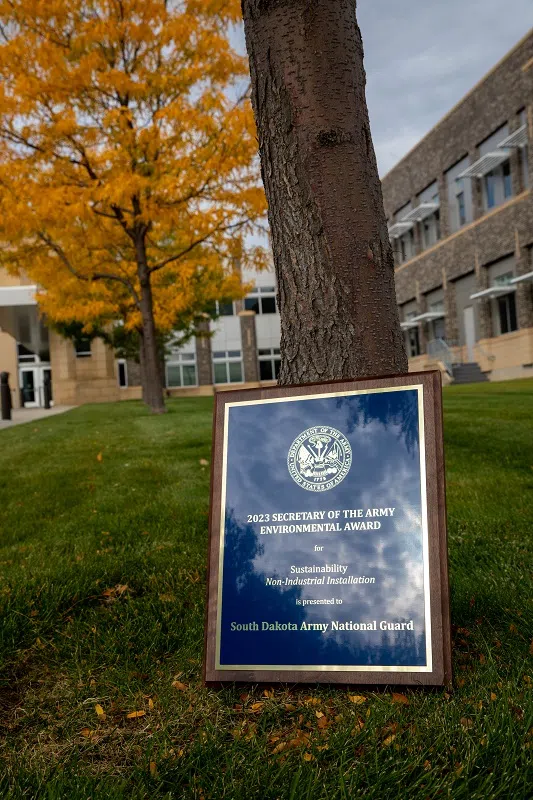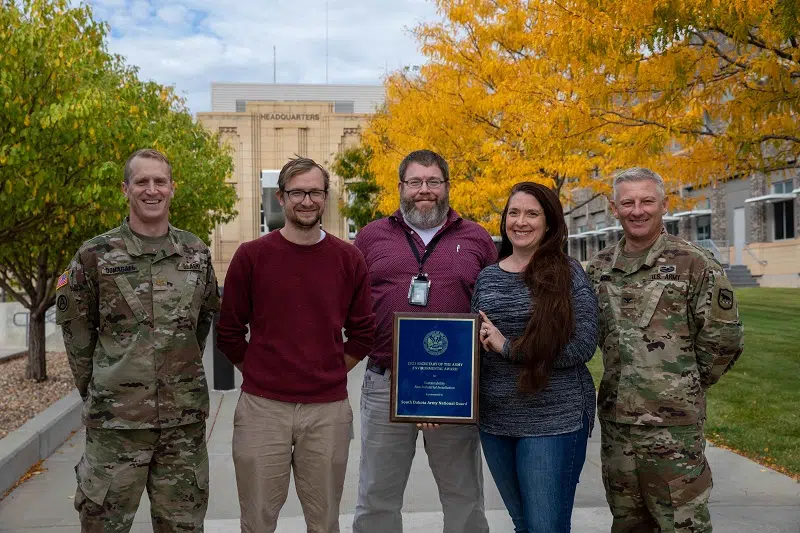The South Dakota National Guard Construction and Facilities Management Office (CFMO) was awarded the 2023 Secretary of the Army Environmental Award for Sustainability, Non-Industrial Installation. The SDNG placed first among all Army installations across the globe. The win at the Army level allowed the SDNG to compete against all Department of Defense agencies, which earned the organization a respectable second place. Kadena Air Base, Japan was selected as the winner.
“Blending environmental stewardship within military operations is not an easy task, however our environmental team has performed exceptionally for many years,” stated Col. Dana Limbo, Director of Construction and Facilities Management Office. “To see them receive an award highlighting their ability to work with equipment maintenance shops, statewide energy management, and building maintenance to incorporate environmental stewardship into our SDARNG daily operations is outstanding.”
The Sustainability, Non-Industrial Installation award recognizes efforts to prevent or eliminate pollution at the source, including practices that increase efficiency and sustainability in the use of raw materials, energy, water, or other resources. The sustainability award evaluates overall energy efficiency and renewable energy practices, greenhouse gas emissions reduction efforts, toxic and hazardous chemical reduction efforts. Evaluators also consider the procurement of sustainable goods and services, waste diversion, electronic stewardship, and efforts to plan for adaptation and resilience. Sustainable practices ensure that DoD protects valuable resources critical to mission success. Non-industrial installations are large or small installations that include ranges, test centers, contracting and policy agencies, and research-and-development centers.
“The ethic of sustainability is taking root throughout the statewide installations,” stated Maj. William Domagall, SDNG Environmental Program Manager. “We have the ability to shift perspectives in energy reduction and waste diversion in communities and installations across the state.”
The SDNG already accomplished the Army’s 2025 goal of 50% waste diversion by achieving a diversion rate of 52.97% last year. The Planning and Programming branch were instrumental in reducing energy consumption by 4.7% in Fiscal Year 2021, which exceeded the target amount. The SDNG is also pursuing other measures to reduce energy consumption by utilizing passive heating solar walls and geothermal heating and cooling. Domagall is also looking at ways to expand recycling efforts in smaller, under-served communities.
The SDNG is sharing lessons-learned with other state agencies to promote waste diversion and energy reduction. “In areas where recycling vendors are rare or very small, the demand generated by the SDNG could make the difference in supporting or enabling local businesses to meet those needs,” Domagall stated.

The South Dakota National Guard Construction and Facilities Management Office (CFMO) was awarded the 2023 Secretary of the Army Environmental Award for Sustainability, Non-Industrial Installation. The achievement is also credit to multiple SDNG sections partnering together, the continued efforts of the facilities maintenance team. The SDNG placed first among all Army installations across the globe, and against all Department of Defense agencies, earning the organization a respectable second place.
(U.S. Army National Guard photo by Staff Sgt. Breanne Donnell)









Comments